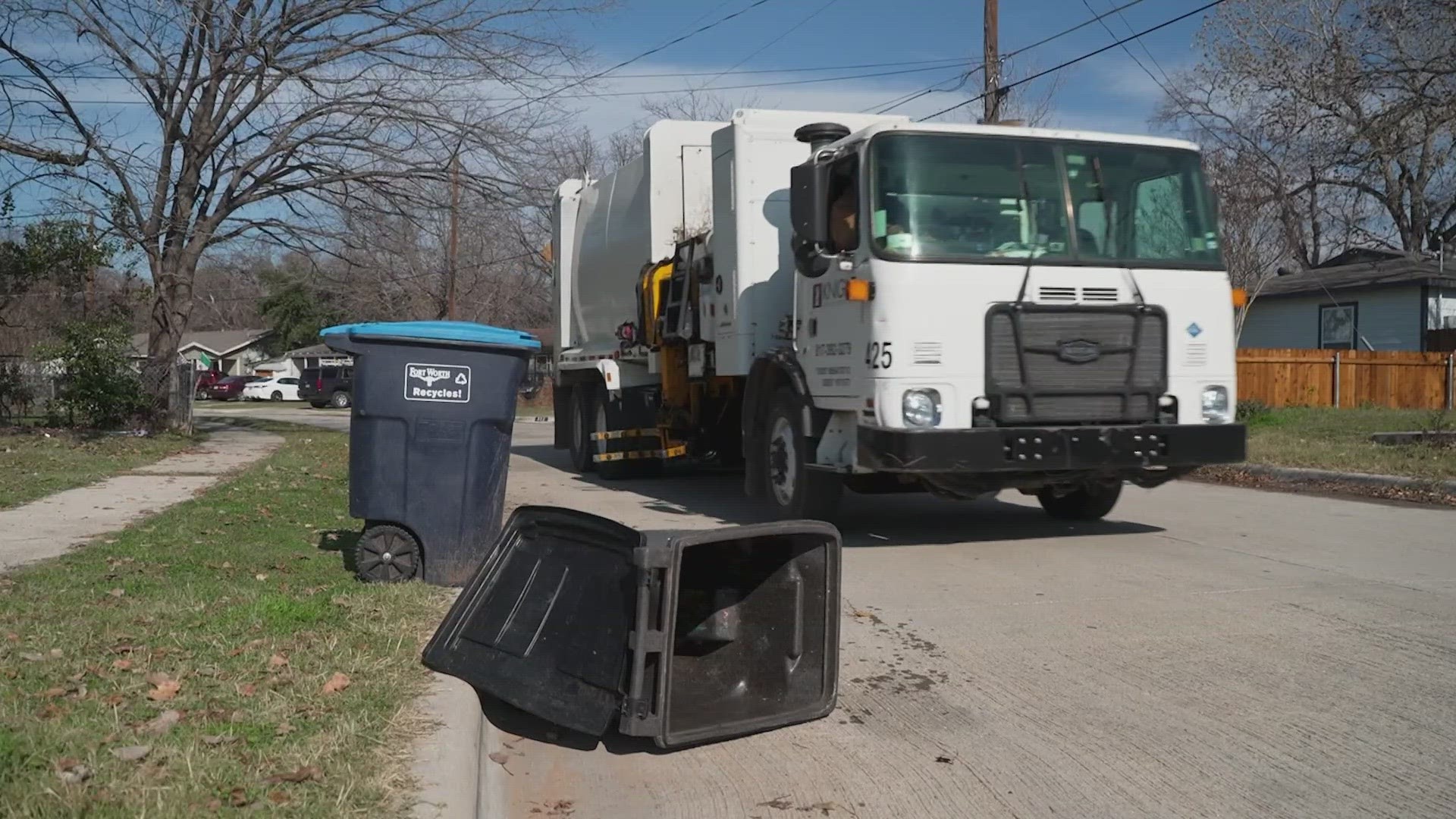FORT WORTH, Texas — Beginning this week, the city of Fort Worth will fine residents for overflowing garbage bins or loose trash bags left at the curb.
The City Council approved the fee structure in September. It took effect on Jan. 1.
Violators will pay $6 for bins that are too full to close and $3 for each trash bag left outside the bin. The fees will appear on residents' water bills.
"Even a small number of people having overloaded carts or putting bags outside the cart tends to slow the system down," Fort Worth contract services administrator for solid waste Christian Harper said. "That also adds a cost."
Fort Worth pays a fine for each overflowing bin and loose bag to its garbage collecting contractors, Waste Management, and Knight Waste Services. Until now, the city has mostly eaten the cost of violations on behalf of its residents.
As the city rapidly grows, those costs increase. Passing the fees on to violators will help ensure the city's solid waste fund is solvent and encourage cleanliness, Harper said.
"The goal is not to have a revenue stream," he added. "The goal is to offset our costs with waste management and, ultimately, get everybody rightsized... and following the rules and ordinances."
Technology helps with enforcement
To enforce the rules, the contractors' garbage trucks are equipped with special cameras that will document violations. Those reports will be forwarded to the city, whose experts will review each case and determine whether to issue the resident a fine.
Residents can appeal the fine in municipal court, though Harper expects the photographic evidence the garbage trucks now provide will resolve most disputes earlier.
"It basically turns everything that's subjective in the world of trash to being objective," he said. "Pictures say 1,000 words."
In cases where neighbors place garbage bins close together, serial numbers on the cans will help the city identify which resident is in violation.
"There are a number of times where, admittedly, it's impossible to determine who put that (bin) out," Harper said. "In those cases, the city will still compensate Waste Management or Knight Waste for picking that up, but we'll not pass that charge on to a specific resident unless we are 100 percent sure that that material goes with that particular resident."
Eventually, artificial intelligence may streamline the process. Waste Management envisions its technology identifying violations and sorting garbage from recyclable material inside the truck.
How to avoid fines
Fort Worth has not raised its solid waste fees since 2006. Residents pay for garbage collection and recycling with a single fee, based on the size of the garbage bin they use.
A 32-gallon cart costs $12.50 per month, a 64-gallon cart costs $17.50 per month, and a 96-gallon cart costs $22.75 per month. Residents can request up to two carts for their homes, though the city can make an exception in a unique circumstance.
Proper recycling is the most effective way to reduce the material inside a single trash bin, Harper said.
"The better recyclers that residents can be - and we can all be better, as Fort Worth residents - the less trash they'll generate," he added.
Cardboard, for example, is a bulky, recyclable material that should not be placed in a trash bin or left out for bulk trash pickup.
"We lose thousands and thousands of tons of cardboard to the garbage every month," Harper estimated, calling the material a "valuable commodity" that should not be wasted.
Residents can also dump bagged garbage at drop-off locations around Fort Worth.
Other cities' policies
Fort Worth began issuing trash bins to residents in 2003. That system allowed the City to scale back collections to once each week.
Dallas also collects trash once each week. Residents can request additional carts to help avoid overflow citations.
"Sanitation customers must place garbage and recycle materials in City provided roll carts. Carts must not be overloaded to the point where spillage occurs from overflow, wind, or handling," a city spokesperson wrote in a statement to WFAA. "Containers must be closed or secured at the top to prevent spillage. Sanitation crews will attempt to warn customers of violations by leaving an orange tag on the cart noting the issue. Citations may be issued for violations of these requirements."
The city of Arlington will transition from bagged trash collection to trash cart collection in February. Republic Services, Arlington's trash collection contractor, will move from twice-weekly collections to once-weekly collections at that time.
Overloaded carts and loose bags may not be collected after this transition, a city spokesperson said.
Residents can find more information about that transition here.
The cities of Irving and Grand Prairie do not use rolling carts or bins for trash collection, so they do not fine residents for loose bags. Workers there manually collect trash twice each week.
Plano collects trash once each week, but it does not fine residents for loose bags.
"Our Property Standards division can address accumulated trash as a violation and will send a Notice of Violation to the responsible individuals," a Plano spokesperson wrote in a statement to WFAA. "Should the violation remain past the compliance timeframe or another violation occur within a 12-month timeframe, an abatement work order can be issued to remove the accumulated trash. The property owner is responsible for reimbursing the city for the cost of the work and a $200.00 administrative fee. Court action is also a possibility in extreme situations."

